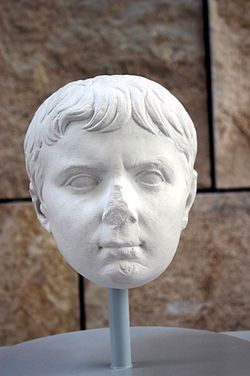Gaius Caesar: Difference between revisions
m Bot: Migrating 27 interwiki links, now provided by Wikidata on d:q298162 (Report Errors) |
"Princeps |
||
| Line 21: | Line 21: | ||
==Early life== |
==Early life== |
||
Gaius was adopted along with his brother [[Lucius Caesar]] in 17 BC by their maternal grandfather, the [[Roman Emperor]] [[Augustus]], who named the two boys his heirs. In 6 BC the Roman plebs agitated for Gaius to be created consul, despite the fact that he was only 14 and had not yet assumed the [[toga virilis]]. As a compromise, it was agreed that he should have the right to sit in the Senate House, and he was made consul designatus with the intention that he should assume the consulship in his twentieth year. Gaius was at this point created " |
Gaius was adopted along with his brother [[Lucius Caesar]] in 17 BC by their maternal grandfather, the [[Roman Emperor]] [[Augustus]], who named the two boys his heirs. In 6 BC the Roman plebs agitated for Gaius to be created consul, despite the fact that he was only 14 and had not yet assumed the [[toga virilis]]. As a compromise, it was agreed that he should have the right to sit in the Senate House, and he was made consul designatus with the intention that he should assume the consulship in his twentieth year. Gaius was at this point created "Youth Leader" ("princeps iuventutis"), an honorific that made him one of the symbolic heads of the equestrian order. Lucius, three years his junior, was granted the same honours after the appropriate interval had elapsed. Temples and statues were erected in their honour (as in the case of the [[Maison Carrée]] in [[Nîmes]]). In 1 BC he was made army commander in the East and made a [[peace treaty]] with [[Phraates V of Parthia|Phraates V]] on an island in the river [[Euphrates]]. In 1 AD, he was made [[Roman consul|Consul]] with [[Lucius Aemilius Paullus (consul 1)|Lucius Aemilius Paullus]] as his colleague. |
||
[[Image:Gaius Cäsar.jpg|thumb|left|Gaius Caesar]] |
[[Image:Gaius Cäsar.jpg|thumb|left|Gaius Caesar]] |
||
Revision as of 08:53, 22 February 2013
- See also Gaius Julius Caesar (disambiguation), for others of the same name.
Gaius Caesar
 | |||||
|---|---|---|---|---|---|
| Born | 20 BC Rome | ||||
| Died | 21 February 4 AD Lycia | ||||
| Burial | |||||
| Spouse | Livilla | ||||
| |||||
| Father | Marcus Vipsanius Agrippa | ||||
| Mother | Julia the Elder | ||||
| Roman imperial dynasties | ||
|---|---|---|
| Julio-Claudian dynasty | ||
| Chronology | ||
|
27 BC – AD 14 |
||
|
AD 14–37 |
||
|
AD 37–41 |
||
|
AD 41–54 |
||
|
AD 54–68 |
||
|
||
Gaius Julius Caesar (20 BC – 21 February AD 4), most commonly known as Gaius Caesar or Caius Caesar, was the oldest son of Marcus Vipsanius Agrippa and Julia the Elder.[1] He was born between 14 August and 13 September 20 BC or according to other sources in 23 September 20 BC with the name Gaius Vipsanius Agrippa, but when he was adopted by his maternal grandfather Roman Emperor Augustus, his name was changed to Gaius Julius Caesar.
Early life
Gaius was adopted along with his brother Lucius Caesar in 17 BC by their maternal grandfather, the Roman Emperor Augustus, who named the two boys his heirs. In 6 BC the Roman plebs agitated for Gaius to be created consul, despite the fact that he was only 14 and had not yet assumed the toga virilis. As a compromise, it was agreed that he should have the right to sit in the Senate House, and he was made consul designatus with the intention that he should assume the consulship in his twentieth year. Gaius was at this point created "Youth Leader" ("princeps iuventutis"), an honorific that made him one of the symbolic heads of the equestrian order. Lucius, three years his junior, was granted the same honours after the appropriate interval had elapsed. Temples and statues were erected in their honour (as in the case of the Maison Carrée in Nîmes). In 1 BC he was made army commander in the East and made a peace treaty with Phraates V on an island in the river Euphrates. In 1 AD, he was made Consul with Lucius Aemilius Paullus as his colleague.

In 1 BC, he married his relative, Livilla, daughter of Drusus the Elder and Antonia Minor. This union had no issue.[2]
Lucius died at Massalia in Gaul on 21 or 22 February AD 2 and his cenotaph is situated there. Gaius died two years later in Lycia at the age of 24, after being wounded during a campaign in Artagira, Armenia.[3]
The death of both Gaius and Lucius, the Emperor's two most favored heirs, compelled Augustus to adopt his stepson, Tiberius, and his sole remaining grandson, Postumus Agrippa as his new respective heirs.
It has been suggested by Tacitus that there may be been foul play involved in the death of Gaius and that Gaius' step mother Livia may have had a hand in his death. Livia's presumed motive may have been to orchestrate the accession of her own son Tiberius as heir to Augustus.[4]
| Family of Gaius Caesar | |||||||||||||||||||||||||||||||||||||||||||||||||||||||||||||||||||||||||||||||||||||||||||||||||||||||||||||||||||||||||||||||||||||||||||||||||||||||||||||||||||||||||||||||||||||||||||||||||||||||||||||||||||||||||||||||||||||||||||||||||||||||||||||||||||||||||||||||||||||||||||||||||||||||||||||||||||||||||||||||||||||||||||||||||||||||||||||||||||||||||||||||||||||||||||||||||||||||||||||||||||||||||||||||||||||||||||||||||||||||||||||||||||||||||||||||||||||||||||||||||||||||||||||||||||||||||||||||||||||||||||||
|---|---|---|---|---|---|---|---|---|---|---|---|---|---|---|---|---|---|---|---|---|---|---|---|---|---|---|---|---|---|---|---|---|---|---|---|---|---|---|---|---|---|---|---|---|---|---|---|---|---|---|---|---|---|---|---|---|---|---|---|---|---|---|---|---|---|---|---|---|---|---|---|---|---|---|---|---|---|---|---|---|---|---|---|---|---|---|---|---|---|---|---|---|---|---|---|---|---|---|---|---|---|---|---|---|---|---|---|---|---|---|---|---|---|---|---|---|---|---|---|---|---|---|---|---|---|---|---|---|---|---|---|---|---|---|---|---|---|---|---|---|---|---|---|---|---|---|---|---|---|---|---|---|---|---|---|---|---|---|---|---|---|---|---|---|---|---|---|---|---|---|---|---|---|---|---|---|---|---|---|---|---|---|---|---|---|---|---|---|---|---|---|---|---|---|---|---|---|---|---|---|---|---|---|---|---|---|---|---|---|---|---|---|---|---|---|---|---|---|---|---|---|---|---|---|---|---|---|---|---|---|---|---|---|---|---|---|---|---|---|---|---|---|---|---|---|---|---|---|---|---|---|---|---|---|---|---|---|---|---|---|---|---|---|---|---|---|---|---|---|---|---|---|---|---|---|---|---|---|---|---|---|---|---|---|---|---|---|---|---|---|---|---|---|---|---|---|---|---|---|---|---|---|---|---|---|---|---|---|---|---|---|---|---|---|---|---|---|---|---|---|---|---|---|---|---|---|---|---|---|---|---|---|---|---|---|---|---|---|---|---|---|---|---|---|---|---|---|---|---|---|---|---|---|---|---|---|---|---|---|---|---|---|---|---|---|---|---|---|---|---|---|---|---|---|---|---|---|---|---|---|---|---|---|---|---|---|---|---|---|---|---|---|---|---|---|---|---|---|---|---|---|---|---|---|---|---|---|---|---|---|---|---|---|---|---|---|---|---|---|---|---|---|---|---|---|---|---|---|---|---|---|---|---|---|---|---|---|---|---|---|---|---|---|---|---|---|---|---|---|---|---|---|---|---|---|---|---|---|---|---|---|---|---|---|---|---|---|---|---|---|---|---|---|---|---|---|---|---|---|---|---|---|---|---|---|---|---|---|---|---|---|---|---|---|---|---|---|---|---|---|---|---|---|---|---|---|---|---|---|---|---|---|---|---|---|---|---|---|---|---|---|---|---|---|---|
| |||||||||||||||||||||||||||||||||||||||||||||||||||||||||||||||||||||||||||||||||||||||||||||||||||||||||||||||||||||||||||||||||||||||||||||||||||||||||||||||||||||||||||||||||||||||||||||||||||||||||||||||||||||||||||||||||||||||||||||||||||||||||||||||||||||||||||||||||||||||||||||||||||||||||||||||||||||||||||||||||||||||||||||||||||||||||||||||||||||||||||||||||||||||||||||||||||||||||||||||||||||||||||||||||||||||||||||||||||||||||||||||||||||||||||||||||||||||||||||||||||||||||||||||||||||||||||||||||||||||||||||
See also
References
- ^ Wood, Susan. (1999) Imperial Women: A Study in Public Images, 40 B.C. – A.D. 68 "Brill Academic Publishers". p. 321. ISBN 90-04-11969-8.
- ^ Hazel, John. (2002) Who's Who in the Roman World "Routledge (UK)". p. 48. ISBN 0-415-29162-3.
- ^ Mommsen, Theodore. (1996) A History of Rome Under the Emperors "Routledge (UK)". p. 107. ISBN 0-415-10113-1.
- ^ Tacitus, The Annals 1.3
External links
![]() Media related to Gaius Caesar at Wikimedia Commons
Media related to Gaius Caesar at Wikimedia Commons
